What Are the Signs of Parasitic Infections in Chinchillas?
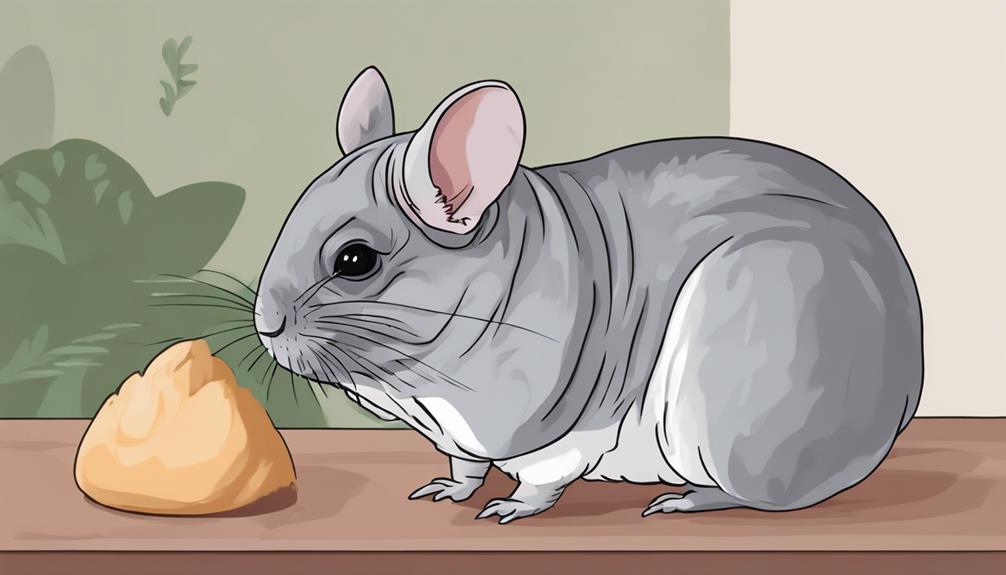
Parasitic infections in chinchillas can be serious and potentially life-threatening if not addressed promptly. Common signs of parasitic infections in chinchillas include changes in appetite, weight loss, lethargy, diarrhea, bloating, and rough or unkempt fur.
Additionally, chinchillas with parasitic infections may exhibit symptoms such as scratching or itching excessively, visible parasites in their fur or feces, and a hunched posture. It is essential to consult a veterinarian experienced in treating exotic pets if you suspect that your chinchilla may have a parasitic infection. Early detection and treatment are crucial for a successful recovery.
Hair Loss or Patchy Fur
Hair loss or patchy fur in chinchillas may indicate the presence of parasitic infections. Fur discoloration and dermatitis are common signs associated with mange mites or ringworm infestations. Chinchillas affected by these parasites often exhibit areas of fur loss, which can vary from mild to severe. The fur may appear thin, uneven, or have bald patches scattered throughout the body. Owners may notice redness, inflammation, or scaly skin in the affected areas, indicating possible underlying parasitic activity.
It is crucial to monitor any changes in the chinchilla’s fur quality regularly. Early detection of fur discoloration or patchy fur can lead to timely treatment and better outcomes. Seeking veterinary care is essential when observing such signs, as parasitic infections can spread rapidly and compromise the chinchilla’s health. Prompt intervention can help alleviate discomfort and prevent further complications associated with these parasitic conditions.
Excessive Scratching or Itching
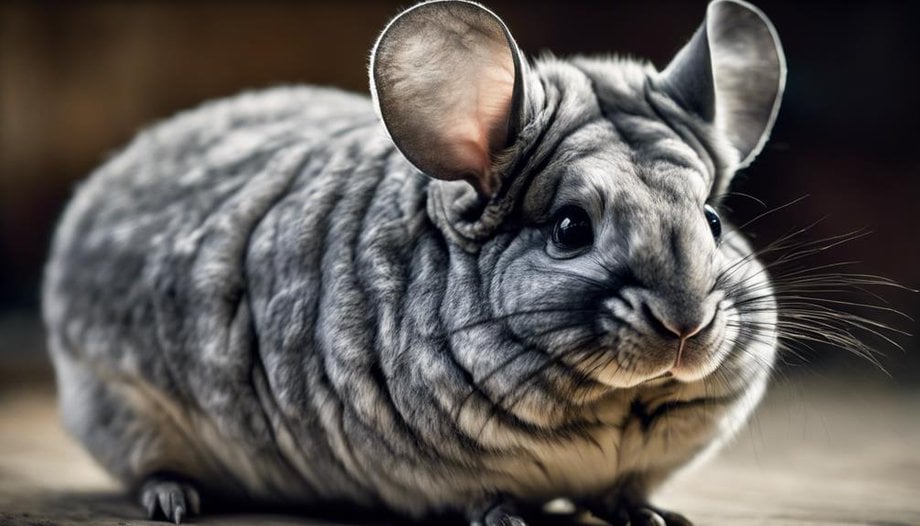
Experiencing persistent and vigorous scratching or itching in chinchillas often indicates the presence of underlying parasitic infections that require prompt attention. Parasites such as mites or fleas can cause significant discomfort to chinchillas, leading to excessive scratching behaviors. Here are some key points to consider regarding excessive scratching or itching in chinchillas:
- Vet Examination: It’s crucial to seek immediate veterinary examination upon noticing excessive scratching in chinchillas to accurately diagnose the underlying cause and initiate appropriate treatment.
- Treatment: Veterinarians may recommend specific anti-parasitic medications or topical treatments to eliminate the parasites causing the itching and provide relief to the chinchilla.
- Prevention: Maintaining good hygiene practices in the chinchilla’s living environment, such as regular cage cleaning and ensuring proper grooming, can help prevent parasitic infestations.
- Regular Vet Check-ups: Scheduling regular veterinary check-ups can aid in the early detection of any potential parasitic infections, allowing for timely intervention and treatment.
Weight Loss or Poor Appetite

Chinchillas with parasitic infections may exhibit weight loss as a prominent indicator of the condition.
Observing changes in appetite, such as a decreased interest in food or a reluctance to eat, can also signal a potential parasitic infestation in these small mammals.
Additionally, behavioral abnormalities like lethargy or decreased activity levels may be noticed in chinchillas suffering from parasitic infections.
Weight Loss Indicator
A common indication of parasitic infections in chinchillas is a noticeable decrease in weight or appetite. This can be concerning as it may signal underlying health issues that need to be addressed promptly.
Here are some key points to consider regarding weight loss indicators in chinchillas:
- Weight Loss: Sudden or significant weight loss can be a red flag for parasitic infections.
- Poor Appetite: Chinchillas may show disinterest in food due to the effects of parasites on their digestive system.
- Lethargy: Weight loss can lead to decreased energy levels and overall lethargy in chinchillas.
- Coat Condition Changes: Parasitic infections can affect the quality of the chinchilla’s fur, which may become dull or unkempt.
Appetite Changes Observed
Observing changes in appetite, specifically weight loss or poor appetite, can serve as crucial early indicators of potential parasitic infections in chinchillas. Weight loss may occur due to the parasites consuming essential nutrients meant for the chinchilla. However, poor appetite can also signal discomfort or pain caused by the parasites within the chinchilla’s gastrointestinal tract.
If these signs are noticed, it’s imperative to seek veterinary care promptly. The veterinarian may recommend specific dietary supplements to help support the chinchilla’s nutritional needs during the treatment process.
Monitoring the chinchilla’s appetite closely and following the veterinarian’s guidance can aid in addressing parasitic infections effectively and promoting the chinchilla’s recovery.
Behavioral Abnormalities Noticed
Noticing behavioral abnormalities such as weight loss or poor appetite in chinchillas can be indicative of underlying parasitic infections. These changes may signal distress in the chinchilla’s physical health and well-being. When observing behavioral abnormalities in chinchillas, it’s crucial to consider various factors that may contribute to these symptoms.
- Stress induced behaviors: Chinchillas may exhibit unusual behaviors when under stress, which can manifest as weight loss or a decreased appetite.
- Grooming habits: Changes in grooming patterns, such as excessive grooming or a lack of grooming, can also be signs of parasitic infections.
- Social interactions: Alterations in social behavior, like isolation or aggression, could indicate underlying health issues.
- Environmental changes: Adjustments in the chinchilla’s environment may impact their behavior and eating habits, potentially revealing parasitic infections.
Lethargy and Decreased Activity
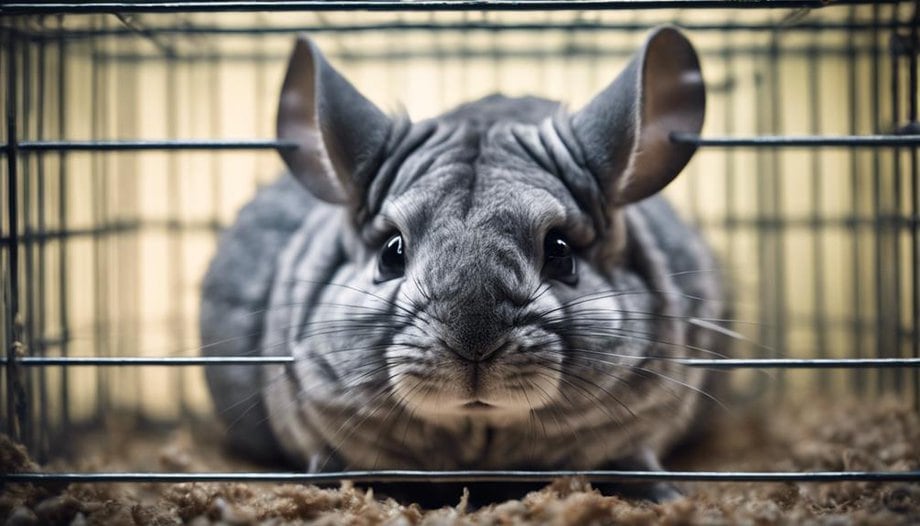
Chinchillas infected with parasites often exhibit lethargy and a noticeable decrease in their usual level of activity. These changes in behavior can be indicative of underlying health issues affecting the chinchilla’s energy levels. Owners should pay close attention to any alterations in their chinchilla’s activity patterns as they may provide crucial clues for parasite detection.
Lethargy in chinchillas can manifest as a lack of interest in usual activities, decreased movement, and overall reduced responsiveness to stimuli. This change in behavior is concerning as chinchillas are typically active and agile animals. Owners may notice their chinchilla spending more time resting or sleeping than engaging in normal play or exploration.
A decreased level of activity in chinchillas infected with parasites can also be accompanied by other symptoms such as weight loss, changes in appetite, and rough fur. It’s essential for owners to monitor their chinchilla closely and seek veterinary care if any concerning signs are observed.
Diarrhea or Abnormal Stool
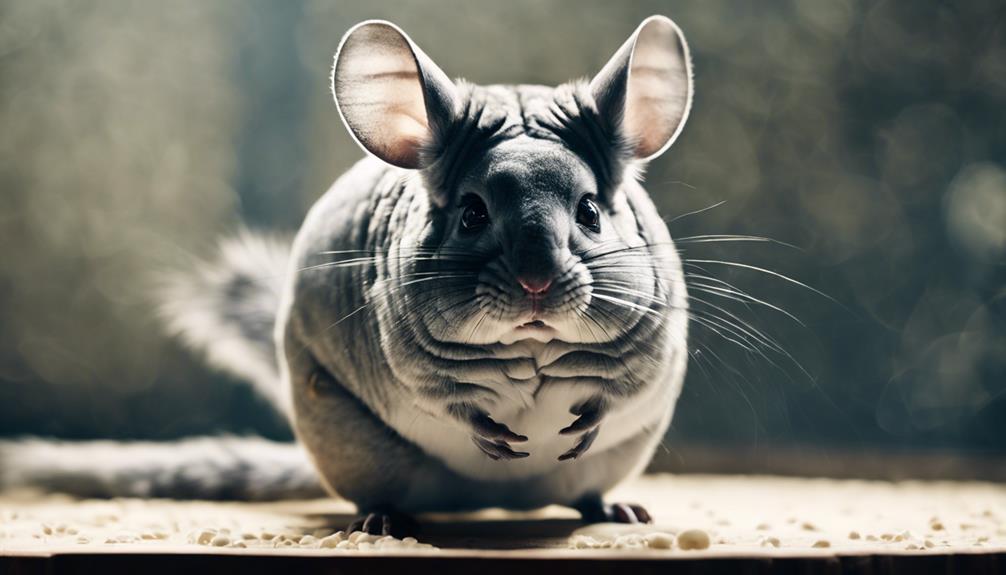
Chinchillas with parasitic infections may exhibit diarrhea or present with abnormal stool consistency. Owners should be vigilant for changes in the chinchilla’s bowel movements, including increased frequency or loose, watery stool.
Additionally, the presence of blood in the stool may indicate a more severe parasitic infection that requires immediate veterinary attention.
Stool Consistency Changes
Signs of parasitic infections in chinchillas may manifest as changes in stool consistency, such as diarrhea or abnormalities in their fecal matter. When observing these changes, it’s crucial to take action promptly to ensure the chinchilla’s health and well-being.
Here are some important steps to consider:
- Hydration: Ensure the chinchilla has access to fresh water at all times to prevent dehydration.
- Isolation: Separate the infected chinchilla from others to prevent potential spread of parasites.
- Veterinary Consultation: Seek professional advice from a veterinarian experienced in exotic pets.
- Diagnostic Testing: Have the veterinarian perform fecal tests to identify the specific parasite and determine the appropriate treatment plan.
Early intervention through these measures can help alleviate the chinchilla’s discomfort and prevent further health complications.
Frequent Bowel Movements
Frequent bowel movements, including diarrhea or abnormal stool consistency, are commonly observed indicators of parasitic infections in chinchillas. Owners should consider diet as a factor in managing these symptoms; providing a balanced diet can help support the chinchilla’s gastrointestinal health.
When faced with such issues, seeking veterinary care promptly is crucial. Treatment options may include deworming medications or other prescribed interventions tailored to the specific parasite causing the infection.
Additionally, maintaining proper hygiene practices in the chinchilla’s living environment can aid in preventing parasitic infections. Ensuring a clean cage, fresh water, and regular cleaning can mitigate the risk of reinfection. Owners should follow preventive tips provided by their veterinarian to safeguard their chinchilla’s well-being.
Blood in the Stool
When observing abnormal stool consistency such as diarrhea in chinchillas, the presence of blood in the stool can indicate a potential parasitic infection. This sign should prompt immediate action to prevent further complications. Here are some essential points to consider:
- Consult a Veterinarian: Seek professional help to diagnose the specific parasite causing the infection.
- Treatment Options: The veterinarian may prescribe medication to target and eliminate the parasites.
- Prevention Methods: Maintain a clean living environment and provide a balanced diet to prevent future infections.
- Potential Complications: If left untreated, parasitic infections can lead to dehydration, weight loss, and even death.
Understanding these signs and taking prompt action can help mitigate long-term effects on your chinchilla’s health.
Visible Parasites in Fur or Ears
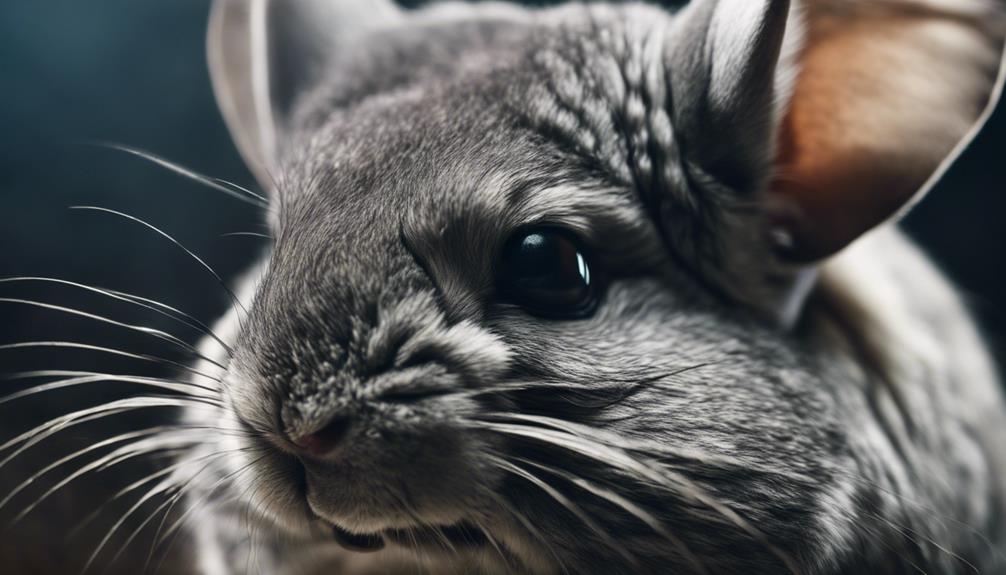
Are visible parasites in the fur or ears of chinchillas indicative of a parasitic infection? Fur mites, a common parasite, may be visible as tiny specks moving around the chinchilla’s fur. Chinchillas are meticulous groomers, so if you notice them scratching excessively or grooming less, it could be a sign of fur mites infestation. Regular grooming habits are essential for chinchillas to maintain their fur health, so any deviation from this behavior warrants attention.
Ear mites, another type of parasite, may cause chinchillas to tilt their heads or scratch their ears frequently. If you observe your chinchilla displaying head tilting behavior or rubbing its ears more than usual, it could indicate an ear mites infestation. Ear mites are highly contagious and can lead to discomfort and infections if left untreated.
Regularly inspecting your chinchilla’s fur and ears for any signs of visible parasites is crucial in detecting and treating parasitic infections promptly. If you suspect your chinchilla has fur or ear mites, consult a veterinarian for proper diagnosis and treatment.
Skin Irritations or Sores
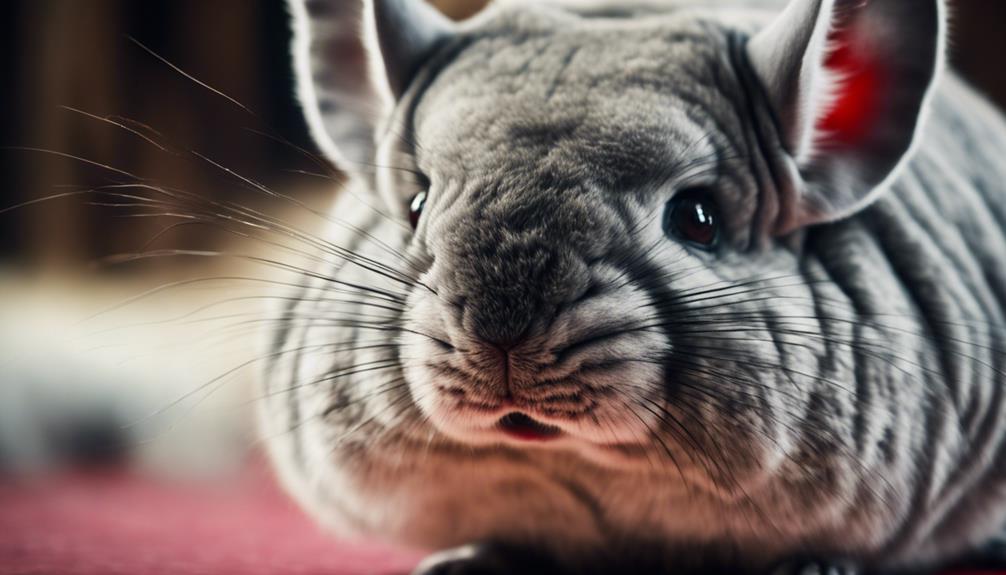
How do skin irritations or sores manifest in chinchillas, indicating a potential parasitic infection? Skin irritations or sores in chinchillas can be a sign of a parasitic infection, such as mites or fungal infections. These skin issues can cause discomfort and distress to the chinchilla, requiring prompt attention and treatment.
Here are some key points to consider when dealing with skin irritations or sores in chinchillas:
- Visible Skin Redness: Watch out for any redness on the skin of your chinchilla, especially if accompanied by scratching or biting at the affected area.
- Hair Loss: Excessive hair loss in localized areas can be a sign of a parasitic infection causing skin irritations or sores.
- Scabs or Lesions: Presence of scabs, lesions, or crusty patches on the skin should raise concerns and prompt a visit to the veterinarian for proper diagnosis and treatment.
- Treatment and Prevention: Proper treatment of skin infections in chinchillas often involves topical medications prescribed by a veterinarian. Regular hygiene practices, such as keeping the chinchilla’s habitat clean and dry, can help prevent parasitic infections that lead to skin irritations or sores.
Frequently Asked Questions
How Can I Prevent Parasitic Infections in My Chinchilla?
To avoid parasitic infections in chinchillas, one must maintain a balanced diet and keep their cage spotless. These practices act as shields against unwanted intruders, ensuring the chinchilla’s health and well-being are safeguarded.
Can Chinchillas Get Parasites From Other Pets in the Household?
Chinchillas can get parasites from other pets in the household, posing cross contamination risks. Parasite transmission between animals is possible, warranting vigilance in preventing such interactions to maintain the chinchilla’s health and well-being.
Are There Any Home Remedies or Natural Treatments for Parasitic Infections in Chinchillas?
Herbal remedies can be considered for treating parasitic infections in chinchillas. While some may show effectiveness, it’s crucial to be aware of potential risks associated with natural treatments. Consulting a veterinarian is advisable for proper diagnosis and guidance.
Can Parasitic Infections in Chinchillas Be Passed on to Humans?
Parasitic infections in chinchillas pose zoonotic risks to humans through direct contact or contaminated environments. Preventive measures include strict hygiene practices like handwashing and avoiding exposure to chinchilla feces. Diligent care minimizes transmission routes.
How Often Should I Bring My Chinchilla to the Vet for Parasite Check-Ups?
Regularly scheduling vet check-ups is crucial for chinchilla health. Prevention is key to avoiding parasitic infections. Vets can recommend treatment options or natural remedies if needed. By prioritizing these appointments, owners ensure their pets’ well-being.











